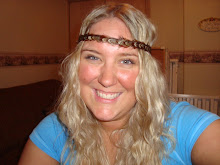
I chose the story of
Arachne in "The Metamorphoses" because it was so strikingly beautiful. I loved the story, and how even though
Arachne was the better weaver, she was still punished. Perhaps my darker side is being shown in this class, but I'm finding that I

love the dark and twisty. I could just imagine
Arachne, weaving, while one day and Minerva put forth the test. Minerva believed that there was no

chance that she would be beaten, so she decided to weave the wonderful things that the god's had done, from Thracian
Rhodope and
Haemus, to
Pygmalean, Antigone, and
Cinyras. All of the mortals who challenged the gods, and wear taught a lesson. She showed all of the times that the god's showed their power and reigned over the mere mortals who dared think they were better than them.
Arachne on the other hand, showed how unjust and horrible the god's wrath could be. She showed pure,
Innocent Europa,
Asterie, Leda,
Antiope,
Amphitryon, Alcmena, Danae,
Aegina, Proserpina, Aeolus,
Enipeus,
Aloids,
Melantho,
Isse,
Erigone, and
Chiron. All innocent
victims of the god's lust and wrath. "Not even
Pallas, even Jealousy, could find a flaw in this girl's artistry" which of course made Minerva crazy, and so

"
the goddess sprinkled the juices of the herbs of Hecate over Arachne; at that venom's touch, her hair and then her eyes and ears fell off, and all her slender fingers clung to her as legs. The  rest is belly; but from this, Arachne spins out a thread; again she practices her weaver's art, as once she fashioned webs
rest is belly; but from this, Arachne spins out a thread; again she practices her weaver's art, as once she fashioned webs." These were my 8 lines because not only are they beautiful, they are so descriptive that you can actually see this happening. I have shown many different paintings of this transformation, either
afterwards, during, or before. It is
fascinating, horrifying, beautiful and brilliant all at the same time.

 I chose the story of Arachne in "The Metamorphoses" because it was so strikingly beautiful. I loved the story, and how even though Arachne was the better weaver, she was still punished. Perhaps my darker side is being shown in this class, but I'm finding that I
I chose the story of Arachne in "The Metamorphoses" because it was so strikingly beautiful. I loved the story, and how even though Arachne was the better weaver, she was still punished. Perhaps my darker side is being shown in this class, but I'm finding that I  love the dark and twisty. I could just imagine Arachne, weaving, while one day and Minerva put forth the test. Minerva believed that there was no
love the dark and twisty. I could just imagine Arachne, weaving, while one day and Minerva put forth the test. Minerva believed that there was no  chance that she would be beaten, so she decided to weave the wonderful things that the god's had done, from Thracian Rhodope and Haemus, to Pygmalean, Antigone, and Cinyras. All of the mortals who challenged the gods, and wear taught a lesson. She showed all of the times that the god's showed their power and reigned over the mere mortals who dared think they were better than them. Arachne on the other hand, showed how unjust and horrible the god's wrath could be. She showed pure, Innocent Europa, Asterie, Leda, Antiope, Amphitryon, Alcmena, Danae, Aegina, Proserpina, Aeolus, Enipeus, Aloids, Melantho, Isse, Erigone, and Chiron. All innocent victims of the god's lust and wrath. "Not even Pallas, even Jealousy, could find a flaw in this girl's artistry" which of course made Minerva crazy, and so
chance that she would be beaten, so she decided to weave the wonderful things that the god's had done, from Thracian Rhodope and Haemus, to Pygmalean, Antigone, and Cinyras. All of the mortals who challenged the gods, and wear taught a lesson. She showed all of the times that the god's showed their power and reigned over the mere mortals who dared think they were better than them. Arachne on the other hand, showed how unjust and horrible the god's wrath could be. She showed pure, Innocent Europa, Asterie, Leda, Antiope, Amphitryon, Alcmena, Danae, Aegina, Proserpina, Aeolus, Enipeus, Aloids, Melantho, Isse, Erigone, and Chiron. All innocent victims of the god's lust and wrath. "Not even Pallas, even Jealousy, could find a flaw in this girl's artistry" which of course made Minerva crazy, and so  "the goddess sprinkled the juices of the herbs of Hecate over Arachne; at that venom's touch, her hair and then her eyes and ears fell off, and all her slender fingers clung to her as legs. The
"the goddess sprinkled the juices of the herbs of Hecate over Arachne; at that venom's touch, her hair and then her eyes and ears fell off, and all her slender fingers clung to her as legs. The  rest is belly; but from this, Arachne spins out a thread; again she practices her weaver's art, as once she fashioned webs." These were my 8 lines because not only are they beautiful, they are so descriptive that you can actually see this happening. I have shown many different paintings of this transformation, either afterwards, during, or before. It is fascinating, horrifying, beautiful and brilliant all at the same time.
rest is belly; but from this, Arachne spins out a thread; again she practices her weaver's art, as once she fashioned webs." These were my 8 lines because not only are they beautiful, they are so descriptive that you can actually see this happening. I have shown many different paintings of this transformation, either afterwards, during, or before. It is fascinating, horrifying, beautiful and brilliant all at the same time. 





